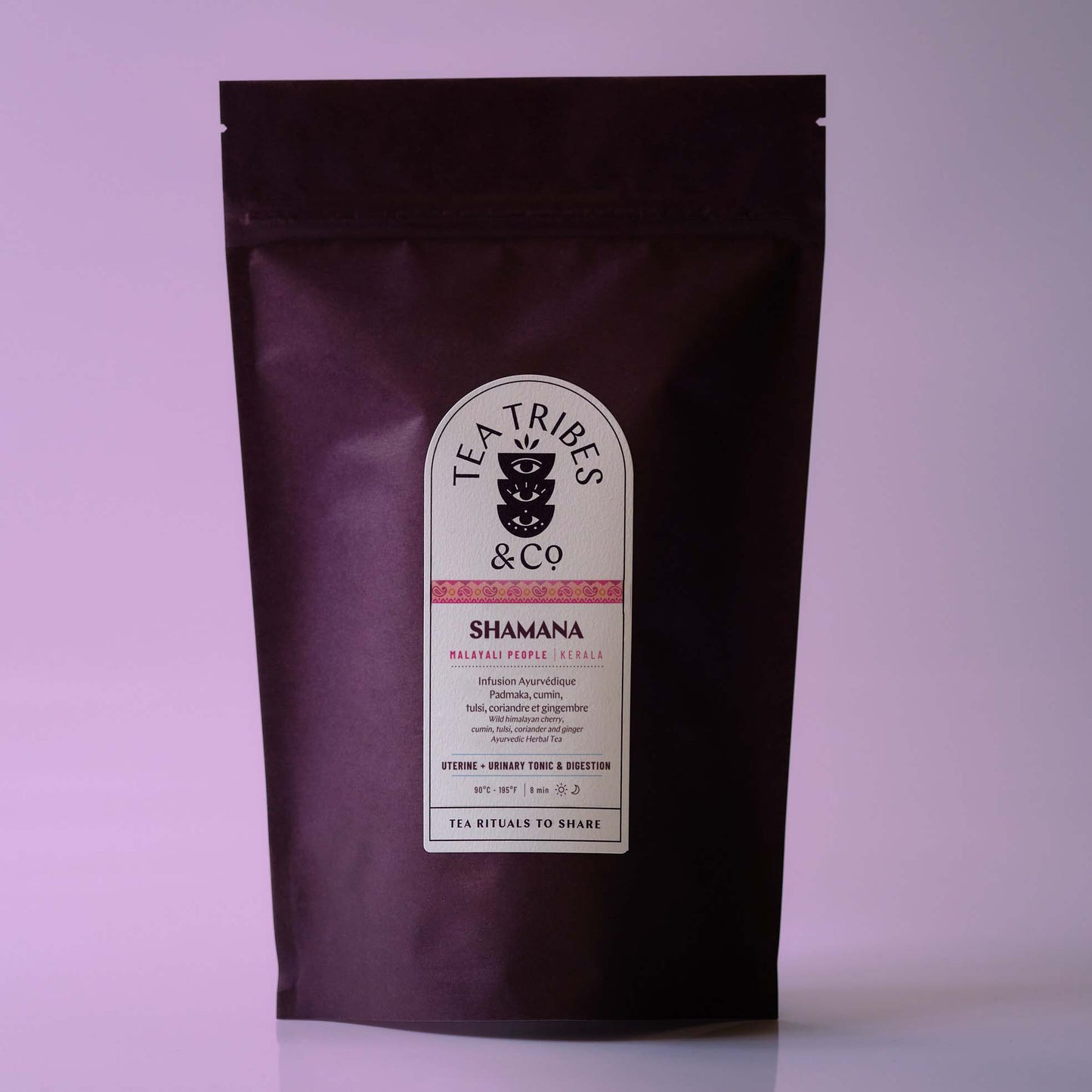MALAYALI PEOPLE / KERALA
SHAMANA
SHAMANA
UTERINE + URINARY TONIC & DIGESTION
Couldn't load pickup availability
Ayurvedic herbal tea of padmaka, cumin, tulsi, coriander and ginger.
- Strengthens the uterus and urinary sphere, reduces bleeding
- Facilitates digestion
Description & history of the SHAMANA
Description & history of the SHAMANA
Kerala is the land where Ayurvedic medicine was born several thousand years ago. This large region in southwest India was already the epicenter of the spice trade when it was called the Malabar Coast. Its dominant people, the Malayalis, make great use of this recipe where Padmaka plays the leading role. This tree, which grows far away, in the wild in the Himalayan chain, has a bark known for its virtues of strengthening the uterus, reducing bleeding and regulating the urinary system. Flavored with cumin, tulsi, coriander and ginger, which share digestive and balancing properties, this is a great ally for women.
Notes: herbaceous and woody
Ingredients, Preparation & Use
Ingredients, Preparation & Use
Ingredients :
Padmaka bark (48%), cumin seed (14%), coriander seed (14%), ginger root (12%), tulsi leaf (12%) - Exclusively artisanal picking of ingredients from India locally certified organic - No flavoring or added sugar.
Preparation:2 large tablespoons for 1 liter of pure water brought to 90°. Infusion 8 to 10'.
Use:As a 2 or 3 week treatment, throughout the day.
Delicious and effective also in an iced version!
A word from the Tea-Triber
A word from the Tea-Triber
Explanations from Ghanashyam Marda, PhD Doctor in Ayurveda :
“We are what we eat and what we drink.” One of the few places where you can put this simple concept of Ayurveda into practice is Kerala, the southern Indian state that has a great heritage of traditional medicine. The practice is so common that even restaurants serve colored water. You are everywhere greeted with a glass of pink water, intended to ensure well-being thanks to its health benefits.
They call it dahasamani, or herbal infused water. Usually it is consumed hot, as most villagers use natural resources to prevent waterborne diseases: they boil water with herbs or spices. And since we consume two to three liters of water per day, the therapeutic effect is real.
The Padmaka tree (Prunus cerasoides in the scientific lexicon), belongs to the Rosacease family and is closely related to apples. It grows wild in the Himalayas. So, getting it from the Himalayas makes things expensive... Many people in Kerala use the bark of sappan wood (Caesalpinia sappan) instead, which gives the same pink color.
Mr. Chandubhai of Rajasthan holds a good source of supply for real Padmaka, as does Mr. Jaitun in the North East. As it involves using the bark of the tree, it is a complicated task to cut it into millimeters for use as an infusion. My wife - Dr. Suraj - and her team went out there and did it manually, going from the biggest wood to small little pieces!
I am proud to offer you, through the SHAMANA infusion, real Padmaka, the bark of which is known for its virtues of strengthening the uterus, reducing bleeding and regulating the urinary system. Here it is enhanced with cumin, tulsi, coriander and ginger, which have digestive and balancing properties in common.






